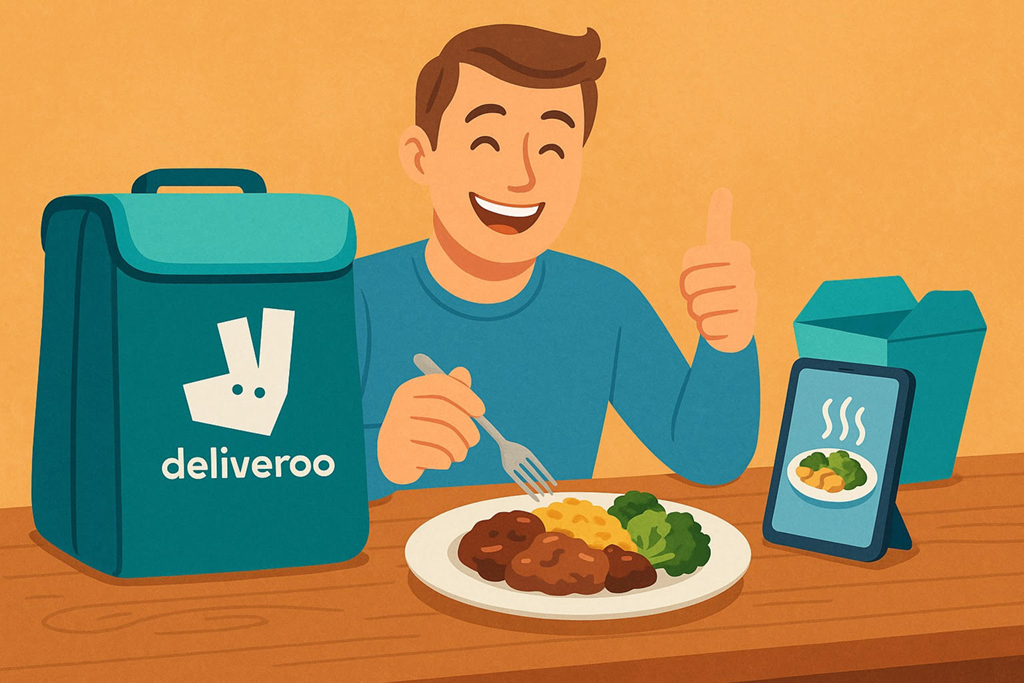StandardFirst investigates: How developed is the eat-at-home economy in BiH
28.10.2025written by: Duško Karišik and Slaviša Lakić
The eat-at-home economy encompasses all services that allow citizens to receive food and necessities directly at their home address. In Bosnia and Herzegovina, this sector includes delivery of ready-made food from restaurants, ordering prepared meals and catering packages, online grocery shopping from supermarkets, as well as the new trend of so-called “ghost” or “cloud” kitchens (virtual kitchens without a physical restaurant). This type of economy has experienced a boom in the past five years, especially under the influence of the COVID-19 pandemic. According to media reports, food delivery via mobile applications flourished during the coronavirus pandemic—the period of lockdowns and restriction measures accelerated the shift of consumers to online food ordering from the comfort of home. At the same time, online grocery shopping began to grow from a low base: in Croatia, for example, the value of online sales of food products in 2022 amounted to only 52 million euros (less than 1% of food retail), but with a growth of ~160% in the period 2019–2022. This suggests a similar trend in BiH—slowly, from small initial numbers, demand for grocery and ready-food delivery is significantly increasing.
Ghost kitchens represent a special segment of the eat-at-home economy. They are virtual kitchens that prepare food exclusively for delivery, without the traditional restaurant space for guests. This concept appeared as a solution for restaurateurs in new circumstances—it reduces costs (no need for a large premises) and optimizes delivery. According to expert sources, food delivery orders worldwide increased by as much as 150% from 2019 to 2020, which is directly connected to changes in consumer behavior during the pandemic. In BiH, the first examples of ghost kitchens are also emerging, especially in urban areas, to meet the growing demand for delivery. Traditional restaurants are introducing separate kitchens exclusively for online orders, and some entrepreneurs are launching completely new virtual restaurant brands that operate solely through delivery platforms.
In short, the eat-at-home services market in BiH is still developing but has been recording accelerated growth in recent years. An increasing number of citizens use apps and web platforms to order food and groceries, which also encourages traditional retailers to adapt. For example, large retail chains in the region (Konzum, Studenac, Vindija, etc.) increasingly cooperate with platforms like Glovo or Wolt to offer fast grocery delivery. Although in BiH the share of online orders in total food trade is still modest, clear trends (digitization of shopping, urbanization, fast-paced lifestyle) suggest that the eat-at-home segment will continue to grow even after the pandemic.
Key market players and their development
In the Bosnian-Herzegovinian food delivery economy, several key players currently stand out, shaping the market from 2019 to 2024:
Glovo: The Spanish platform Glovo entered the BiH market in 2021 by acquiring the domestic brand Donesi. Glovo positioned itself as a global player offering delivery of “everything”—from restaurant food, through groceries, to drugstore products. Glovo’s business model is platform-based: the company describes itself as a technology platform intermediary between consumers, local restaurants/stores, and couriers. In other words, Glovo does not prepare food nor employ couriers directly; it connects restaurants offering products with customers, while the delivery personnel (couriers) carry out the delivery. Glovo charges restaurants a commission and a delivery fee to customers, and engages couriers as partners. After an aggressive market entry, Glovo BiH invested significantly in expanding its service, as shown by financial indicators: in 2021, GlovoApp d.o.o. Sarajevo had revenues of ~1.15 million KM, with expenses of 3.12 million KM, resulting in a net loss of 1.97 million KM that year. The loss was expected during a phase of intensive growth—the company then had 16 employees and large investments in infrastructure and marketing. Today, Glovo operates in multiple BiH cities (Sarajevo, Banja Luka, Tuzla, Mostar, etc.) and seeks to expand market coverage.
Korpa: Korpa d.o.o. is a domestic food delivery platform, launched by local founders (connected with the eKupon and OLX community). As a local competitor, Korpa quickly gained users by focusing on local needs and customer support. In 2021, Korpa recorded the highest revenue on the market—about 3.93 million KM, but with expenses of 4.39 million, resulting in a loss of 455 thousand KM that year. It had 9 employees at the end of 2021. Korpa aggressively built a network of partner restaurants and users and, in competition with Glovo, resorted to strategic partnerships. At the end of 2021, Korpa partnered with the company “Dostava Ceger” Sarajevo, specialized in grocery delivery, attempting to strengthen its position against the global rival. This move integrated the grocery delivery service (ceger.ba) into the Korpa platform, offering a broader range of products (not only restaurant food). Korpa positions itself as a local favorite—users emphasize that Korpa’s advantage is its local origin and understanding of the domestic market, although occasional criticism of customer support has appeared.
Donesi: Donesi.com is a pioneering online food ordering platform in the Balkans (founded in Serbia in 2006), which also operated in BiH through a local portal. Until 2021, Donesi was a significant player in BiH, aggregating offerings from many restaurants. However, with the acquisition of the Donesi brand by Glovo in 2021, Donesi was integrated into the Glovo ecosystem. Practically, Glovo “retired” the Donesi name—users and restaurants migrated to the Glovo app. This centralized the market: global Glovo and local Korpa remain the two main competitors. It is important to note that, although the Donesi brand no longer exists independently, its legacy is significant—Donesi educated the market about online food ordering more than five years ago, paving the way for faster adoption of Glovo and other apps.
Wolt: The Finnish platform Wolt (owned by the American company DoorDash since 2022) already operates in neighboring countries (Serbia, Croatia) and is among the leading delivery services in Europe. In BiH, Wolt is currently (as of 2024) not yet widely present, although there is user interest in its arrival. Competitors and consumers in BiH follow experiences from neighboring markets—in Croatia and Serbia, Wolt operates successfully, implying that Wolt’s entry into BiH would further increase competition and benefit consumers through more choices and potentially better delivery conditions. Wolt is known for focusing on a high level of user experience and fast delivery (often guaranteed within 30 minutes). Considering that Bolt Food (delivery service of the Estonian company Bolt) withdrew its operations from Croatia in October 2024 due to fierce competition, it is assumed that the BiH market would remain with two major regional players (Glovo and potentially Wolt), alongside the domestic Korpa, if Wolt decides to start operations. For now, Wolt has no official operations in BiH, but citizens are familiar with the brand through travel and media, and there is a potential user base anticipating it.
Smaller and specialized players: Besides the above, there are smaller platforms and initiatives in the market. Zapp is one example—a service launched in Mostar, which joined the delivery competition in 2021 and began rapidly expanding. There are also specialized services like the aforementioned Ceger (grocery delivery), which in 2021 was a small company with about 70 thousand KM in revenue and 3 employees, but operating at a loss. Ceger was integrated with Korpa to jointly offer both food and groceries. Some local restaurants developed their own delivery apps or ordering systems (especially fast-food chains), but their reach is limited to their own brands. Additionally, the global app Uber Eats does not formally operate in BiH, and Bolt Food has not yet launched in our market, although Bolt as a transportation service exists in limited capacity.
Market shares and profitability: Exact market share figures in BiH vary as companies do not publish detailed user statistics. Financial reports for 2021 show that Korpa had higher revenue than Glovo in BiH, suggesting that the domestic platform then held a significant part of the market. However, Glovo accelerated growth from 2022 (acquiring the Donesi user base) and probably overtook the leading position in the number of orders by 2024, especially in Sarajevo. None of the leading platforms in BiH had been profitable by 2021—both Glovo and Korpa reported losses, prioritizing growth over current profit. This is not unusual: even in more developed markets, delivery platforms operate at a loss in the first years while building a user network. For comparison, in Croatia in 2023, Glovo and Wolt operated at a loss (Glovo HR -6.3 million €, Wolt HR -40 thousand €) the previous year, while Bolt Food withdrew despite being the only one to achieve a small profit. These trends show that the “race for the market” is in full swing—companies invest more in promotions, discounts, and expansion than they earn in profit, counting on returns once they gain a dominant market share.
Changes in consumer behavior in BiH
One of the key factors in the growth of the eat-at-home economy is changed consumer habits. Citizens of BiH in the past five years increasingly order food and groceries “from the comfort of home,” and the reasons are multiple:
Impact of the pandemic: The period 2020–2021 accustomed many consumers to see online ordering as a normal part of daily life, not just as a luxury or additional convenience. Due to closed restaurants and limited mobility, people began regularly using delivery apps. Many who had not previously tried such services became new users. After easing measures, some consumers continued these habits due to the perceived convenience.
Simplicity and time-saving: Modern life leaves less time for cooking or shopping. A large number of residents, especially in cities, work long hours or have a fast pace, so it is easier for them to complete dinner, lunch, or weekly grocery shopping with a few clicks on their phone. User comments in the region confirm that people are “too busy and find it easier to order food.” Therefore, comfort and time-saving are the main motivators. Instead of cooking after work, ordering a ready meal becomes a common practice, especially among younger generations and working couples.
Digital literacy and trust: Smartphone and internet penetration in BiH is continuously growing, as is the number of people technically capable of using mobile apps for shopping. Trust in online payment is also improving—although many still prefer cash on delivery, the use of cards and digital wallets is increasing. Increased consumer confidence is also seen in the fact that only 16% of respondents in BiH reported problems with online payments, which is stable and relatively low. As transaction security increases, so does the tendency to order online. Additionally, almost everyone today knows someone who uses delivery, and this “word of mouth” promotion also helps remove doubts among new users.
Wider choice and personalization: App offerings have exploded—hundreds of restaurants are available on Glovo and Korpa, from local kebab shops to international cuisines. Such choice in one place was previously impossible without physically visiting the city. Now a user can, with one click, browse menus of dozens of restaurants, read reviews, see ratings, and order. Apps also allow personalized recommendations (e.g., “reorder favorite dish” or discounts for loyal customers), encouraging more frequent use.
Change in social attitude: Ordering food used to be associated only with special occasions or higher standards, while today it is becoming a common practice in the wider population. According to research in Serbia, the average bill per order is between 1,300 and 1,700 dinars (20–30 KM), implying that people often order food for the whole family or group. In BiH, amounts may be slightly lower, but still significant, especially in urban centers. It is no longer unusual to order lunch at work online or to order ready meals on weekends instead of cooking at home. This “normalization” of food ordering is the result of platform marketing and generational changes—younger generations (Gen Z and millennials) grow up with digital services and consider them a standard way of shopping.
All these changes lead to the eat-at-home economy becoming an integral part of daily life. Consumers in BiH are motivated primarily by practicality and time-saving, while secondarily valuing other benefits: the possibility to try new cuisines, easier price comparison of meals, and frequent promotions (discounts, coupons) on apps. On the other hand, certain challenges in consumer behavior still exist—for example, price sensitivity (delivery usually carries an additional delivery fee and tip, which some are reluctant to pay). Additionally, part of the population (primarily older generations) adopts these trends more slowly or remains loyal to traditional shopping. Nevertheless, the general direction is clear: eat-at-home habits are increasing and are expected to continue developing as purchasing power and digital inclusion of the population grow.
Comparative Analysis with the Markets of Serbia and Croatia
For a broader view of the development of the eat-at-home sector, it is useful to compare Bosnia and Herzegovina (BiH) with neighboring markets of Serbia and Croatia, where these trends have also gained momentum in recent years.
Market size and growth:
The food delivery market in Serbia is estimated at over €10 million annually (according to the Center for Public Policy Research), while in Croatia it is even larger due to higher GDP and tourist spending (estimates reach several tens of millions of euros annually, including tourists). Both markets experienced a huge surge in orders during the pandemic – double-digit growth rates. In Serbia, the pandemic accelerated the development of the delivery sector, pushing many new users toward online ordering. After the pandemic, the growth pace slowed somewhat but remained significant (projected ~12% annual growth for online food ordering in the coming years).
Croatia, as an EU member, had somewhat earlier e-commerce development, so food delivery began earlier (first services appeared in the 2010s). However, the largest surge also occurred around 2020–2021. Compared to these, BiH is a smaller market (population ~3.3 million vs. Serbia 7m and Croatia 4m) with slightly lower purchasing power, meaning the total market value is smaller. Exact public data for BiH is unavailable, but based on trends, BiH lags 1–2 years behind neighbors in penetration – what was common in Belgrade or Zagreb in 2020 (mass delivery) became normal in Sarajevo and Banja Luka only by 2021–2022. However, the growth rate in BiH could be higher relatively, as it starts from a lower base (catch-up effect).
Key market players:
Interestingly, the main players are very similar in all three countries, with occasional local competitors. In Serbia, Glovo and Wolt have dominated since 2019, competing with a few smaller rivals, e.g., Mister D (local delivery service linked to a restaurant chain), CarGo Butler (delivery service by CarGo), etc., though their market shares are smaller. Donesi was also present in Serbia but was integrated into Glovo via acquisition. According to the Fairwork report, Glovo and Wolt together hold 70–80% of all orders in Serbia after 2021.
In Croatia, the situation recently included a “big three” – Glovo, Wolt, and Bolt Food. Bolt Food launched in 2020 but ceased operations in October 2024, citing business reasons and focusing on more profitable segments. Thus, only two main players remain – Wolt and Glovo. Both have a strong presence in major cities (Zagreb, Split, Rijeka, Osijek), and Glovo is additionally present in smaller towns due to its earlier acquisition of the local platform Pauza.hr.
In BiH, as described, the main competition is between Glovo and Korpa, with Wolt yet to enter, and Bolt Food inactive. Thus, regional players are closely linked – global platforms view the Balkans as a single market with similar habits, and their strategies (acquisitions, withdrawals) are often implemented simultaneously across countries.
Growth rates and per capita volume:
Per capita spending is highest in Croatia due to a higher standard of living – the average user orders more frequently and spends more. Available data indicates that online food retail (including supermarket delivery) per capita in Croatia was ~€13 in 2022 (€52 million over 4 million people), while in BiH it is likely below €5 per capita, judging by the smaller e-commerce volume (for total e-commerce, the estimate is ~€120 per capita in BiH vs €300+ in Croatia). Serbia is somewhere in between – studies show Serbians spend on average 1,300–1,700 RSD per order (~€10–15), and the market is worth €10+ million annually, which for a population of ~7 million is roughly €1.5 per capita per year for food delivery alone (this seems conservative and may not cover the entire market or is based on older data).
In practice, per capita spending differences also stem from cultural habits – in Croatia, tourists have a big impact, while in Serbia and BiH it depends exclusively on the local population. Urbanization also plays a role: about 57% of Croatians, 56% of Serbians, and 48% of BiH residents live in urban areas. Higher city concentration increases delivery usage, partially explaining lower numbers for BiH. Nevertheless, the growth trend is common to all – Serbia and BiH are expected to catch up with current Croatian penetration levels in the coming years.
Consumer habits and preferences:
It is interesting to compare the most ordered items. In Croatia in 2023, the most requested dishes were burgers, pizzas, and kebabs, but also toys via Glovo Market, showing diversification (people order not only food but also other products through the same platforms). In Serbia, according to delivery personnel, the most ordered items come from well-known fast-food chains (McDonald’s, KFC, etc.), and deliveries also include grocery items and even small essentials like phone chargers or books. BiH follows similar patterns: popular items include fast food (ćevapi, pizza, burgers) and cooked meals from local restaurants. As platforms add categories (pharmacies, drugstores, florists), the variety of orders increases.
In general, consumers in all three countries are motivated by similar benefits – time-saving, convenience, and variety – with Croatia and Serbia, where competition is higher, also benefiting from lower delivery fees and frequent promotions offered by platforms.
Challenges:
All three markets face challenges in the sustainability of this business. Profitability is low (e.g., Glovo Croatia had multimillion losses, Glovo BiH too). An interesting phenomenon in Serbia is the lack of local courier workforce – demand for couriers grew so much that companies hire foreign workers from Uzbekistan, Kyrgyzstan, Cuba, and even Turkey! BiH has not reached this stage yet but already experiences courier shortages during peak hours (weekends, evenings), sometimes delaying delivery. In Croatia, three competitors could not survive – Bolt Food withdrew, implying the market optimally supports two major players. In Serbia and BiH, the market is more fragmented (BiH also has domestic Korpa), but potential new entrants (like Wolt or Bolt) could lead to short-term price reductions and promotions, benefiting consumers but pressuring companies.
Key tax challenges and opportunities for “StandardPrva”
Rapid growth of the eat-at-home sector brings numerous tax and regulatory challenges. This work area – where platforms, restaurants, couriers, and customers interact digitally – often precedes clear regulation. Several key points relevant for tax consulting and opportunities for StandardPrva:
Income and taxation of couriers:
The main challenge concerns couriers working for platforms like Glovo and Korpa. Currently, digital platforms treat them as “independent service providers,” not employees. Many couriers are therefore not formally employed, work informally, or through temporary contracts, without paid contributions. StandardPrva could assist in:Advising couriers on legalizing their status (registering as self-employed or via flat-rate taxation) and helping with income tax registration and bookkeeping.
Advising platforms on compliance – ensuring couriers are documented legally, possibly via agencies or contracts with contributions. Tax optimization for couriers (deducting fuel, vehicle depreciation, etc.) is also a potential service.
Tax consulting for restaurants and hospitality in the platform ecosystem:
Many traditional restaurants entered online sales during the pandemic, creating challenges in revenue accounting and tax reporting. For example, how to fiscalize invoices when an order comes through Glovo? Platforms often handle payments and pay restaurants periodically minus commissions. StandardPrva can provide guidance on:Accounting for platform commissions, VAT treatment, and reporting.
Cumulative revenue tracking to advise restaurants when to enter the VAT system or maintain dual records.
Micro-enterprises and home-based businesses:
Home cooks, bakers, and small family businesses selling through social media or platforms often operate informally. StandardPrva could assist with formalization, registration, flat-rate taxation, and bookkeeping, helping these entrepreneurs grow legally while increasing the state’s tax base.Ghost kitchens and “virtual restaurants”:
Ghost kitchens host multiple virtual brands in a single physical space. StandardPrva could advise on optimal corporate structure, VAT compliance, and cost allocation per brand, as well as guidance on local fees and categorization.Taxes and regulations for platforms (Glovo, Korpa, Wolt):
Platforms face regulatory uncertainty. In BiH, no special law for digital platform work exists yet. Potential issues include local fees for public space usage, transfer pricing, and VAT on intermediary services. StandardPrva could provide tax compliance, transfer pricing guidance, VAT treatment advice, and represent platforms in dealings with authorities.
Opportunities for StandardPrva:
The eat-at-home sector creates an ecosystem of actors requiring tax and accounting services – from individual couriers to small kitchens to large platforms and restaurants. StandardPrva can specialize in the “gig economy” in BiH, offering workshops, practical guides, and direct consulting services, positioning itself as a leading advisor in this niche.
Conclusion:
The eat-at-home economy in BiH has rapidly moved from novelty to mainstream. In the last five years, food delivery and online grocery shopping expanded, with new business models like ghost kitchens emerging. Key players such as Glovo and Korpa invest in growth, consumers increasingly embrace convenience, while regulatory frameworks are catching up. This creates questions – from market sustainability to workers’ rights – but also significant opportunities for expert services. By monitoring local and regional trends (market growth, habits, comparative experiences, and tax implications), StandardPrva can strategically position its services where most needed, helping the sector grow sustainably and legally for the benefit of all participants.
/ / /
"Standard Prva" LLC Bijeljina is a company registered in Bijeljina at the District Commercial Court in Bijeljina. Company’s activities are accountancy, repurchases of receivables, angel investing and other related services. Distressed debt is a part of the Group within which the company repurchases the receivables, which function and are not returned regularly.
Lawyer’s Office Stevanović is the leading lawyer’s office in the region with the seat in Bijeljina. The LO abbreviation represents Lawyer’s Office of Vesna Stevanović and Lawyer’s Office of Miloš Stevanović.
Contact for media press@advokati-stevanovic.com or via telephone 00 387 55 230 000 or 00387 55 22 4444.




